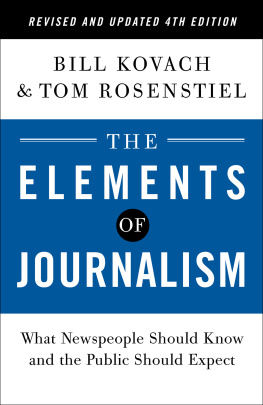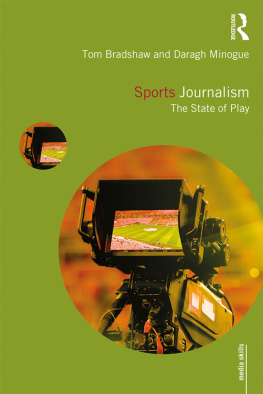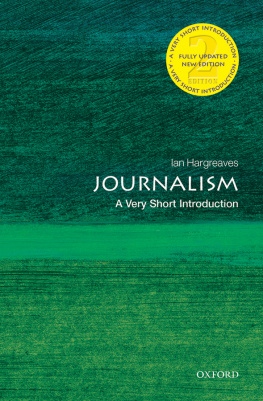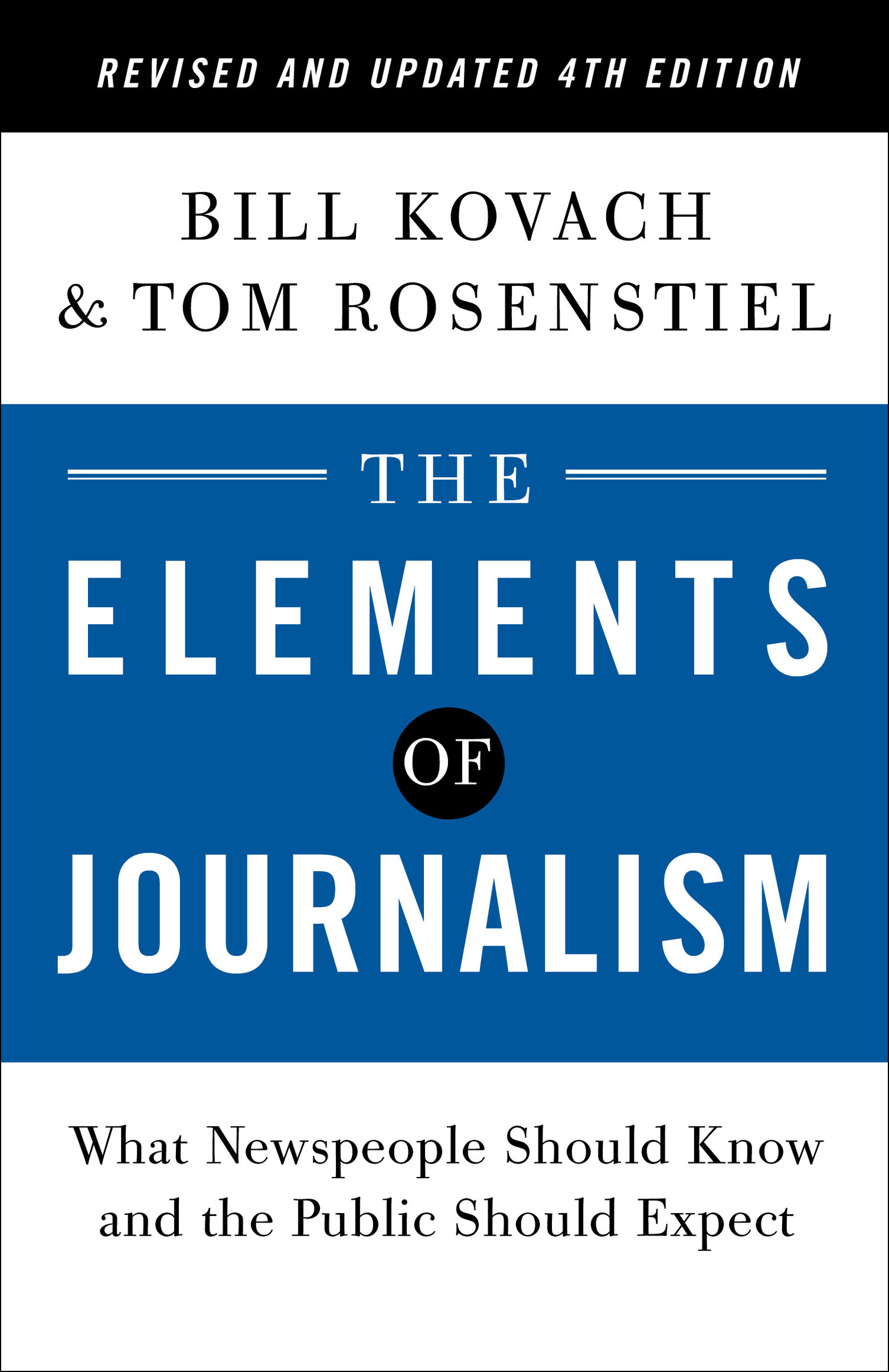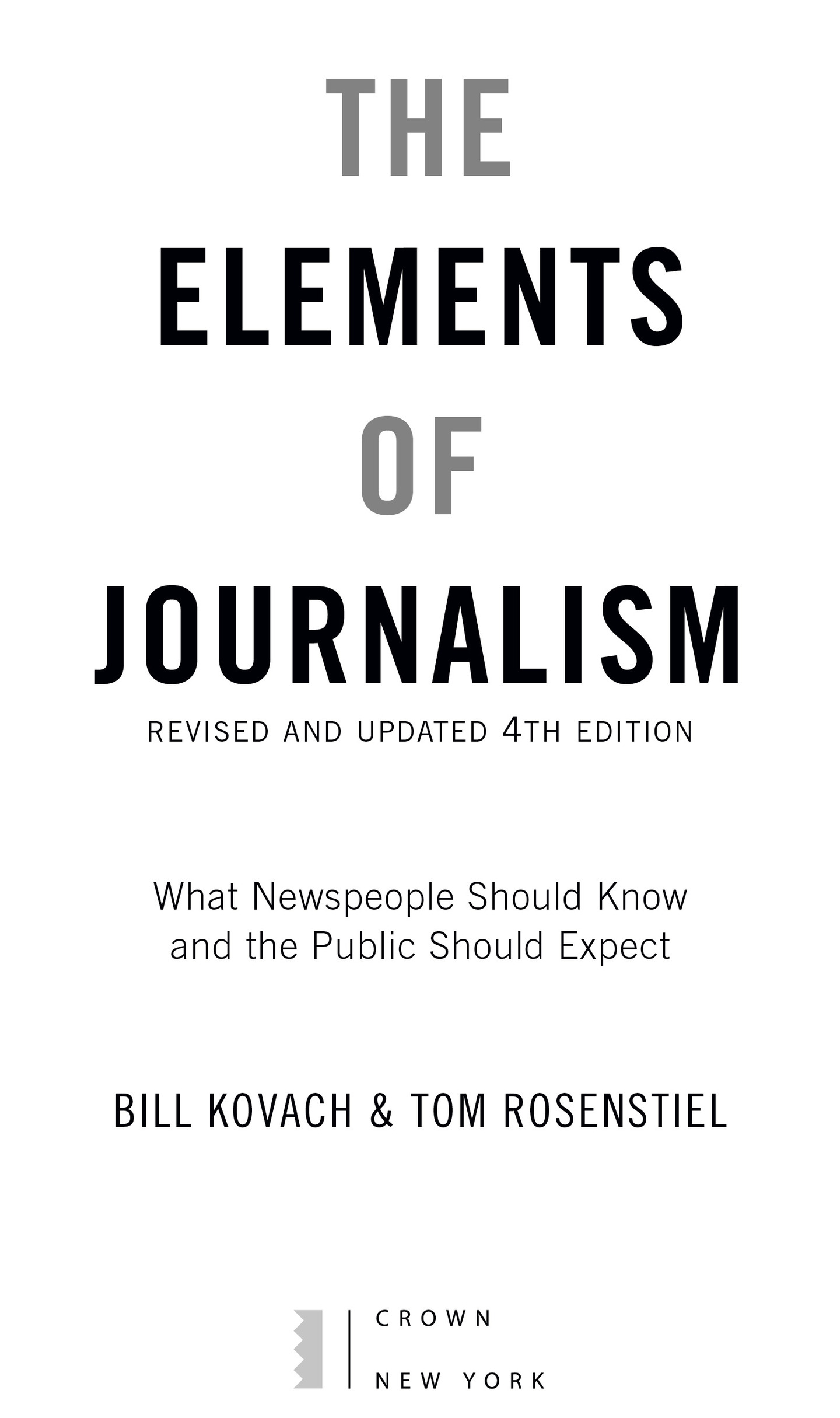Contents
Landmarks
Print Page List
A Crown Trade Paperback Original
Copyright 2001, 2007, 2014, 2021 by Bill Kovach & Tom Rosenstiel
All rights reserved.
Published in the United States by Crown, an imprint of Random House, a division of Penguin Random House LLC, New York.
Crown and the Crown colophon are registered trademarks of Penguin Random House LLC.
Grateful acknowledgment is made to Cable News Network, Inc. (CNN) for permission to reprint a text excerpt from the show Crossfire (October 15, 2004). Reprinted by permission of Cable News Network, Inc. (CNN).
Originally published in hardcover in the United States by Crown Publishers, an imprint of the Crown Publishing Group, a division of Penguin Random House LLC, New York, in 2001 and subsequently revised and published in paperback by Three Rivers Press, an imprint of the Crown Publishing Group, a division of Penguin Random House LLC, New York, in 2007 and 2014.
Library of Congress Cataloging-in-Publication Data
Names: Kovach, Bill, author. | Rosenstiel, Tom, author.
Title: The elements of journalism / Bill Kovach & Tom Rosenstiel.
Description: Revised and updated 4th edition. | New York: Crown, [2021] |
Includes bibliographical references and index.
Identifiers: LCCN 2021012286 (print) | LCCN 2021012287 (ebook) | ISBN 9780593239353 (trade paperback) | ISBN 9780593239360 (ebook)
Subjects: LCSH: Journalistic ethics. | JournalismUnited States.
Classification: LCC PN4756 .K67 2021 (print) | LCC PN4756 (ebook) | DDC 174.9097dc23
LC record available at https://lccn.loc.gov/2021012286
LC ebook record available at https://lccn.loc.gov/2021012287
Ebook ISBN9780593239360
crownpublishing.com
Book design by Alexis Capitini, adapted for ebook
ep_prh_5.7.1_c0_r0
PREFACE TO
THE FOURTH EDITION
Bill Kovach often says that every generation creates its own journalism.
That change doesnt happen gradually. It occurs in fits and starts, as momentous events or dramatic cultural shifts force newsrooms to reexamine themselves.
Look back at the twentieth century and you can see these moments. The notion of applying a more scientific or objective method to gathering news, for instance, came in response to World War I and the Russian Revolution, as thoughtful journalists tried to reckon with failures of their profession at a time when democracy around the world was in doubt. The Hutchins Commission, which developed modern notions of press responsibility, came about after World War II, with the rise of electronic media and attempts by fascist regimes to make an evil science of propaganda. The first edition of this book, twenty years ago, was in response to the fragmentation of media caused by the emerging new technologies of cable and the internet and a new wave of sensationalism that resulted in the face of the financial pressures those technologies created.
Today, in 2021, a new reexamination of journalism is under way. That reckoning is the result of the convergence of disparate but powerful forces. Journalism is threatened by the collapse of its advertising model. It is threatened by a culture at the all-powerful platform companies such as Facebook, Twitter, and YouTube, which is built around what separates peopleso they can be targeted for advertisingrather than what unites them. It is threatened by the rise of despotic leaders around the world who want to denigrate a free press and the fact-based approach to civic life that it represents. And it is driven by a reckoning in newsrooms over the failure of usually white- and male-dominated staffs to understand, care about, and cover people of color and the systemic racial injustice in the country. At the same time, those same newsrooms have managed to almost entirely alienate people in the United States who call themselves conservative.
The first step for a field in crisis is to recall the fundamentals that informed the field in the first place. It is critical, next, to be able to distinguish which fundamentals are enduring from the everyday routines or practices employed to put those principles into practice. For example, the need to verify accounts to get to a more accurate understanding of civic life is a fundamental principle. The tools we use to do that verification change with new technology, with algorithms that can match pictures to place and history, check identification, even search for quotes. Yet it is astonishing how wedded professions become to their habits and how easy it is to mistake cherished routines for something more fundamental.
The second step for a field in crisis, then, is to identify and abandon worn-out practices, to rethink how best to fulfill its fundamental principles, and to recognize new ways to perform the services that society requires of it.
The elements of journalism that we describe in this book are nothing more than a description of what society requires of those who produce the newswhether they do so in a large professional setting or for a one-person newsletter they produce in their spare time and distribute on a platform designed for sole producers like Substack.
When we produced the first edition of this book in 2001, we set out to identify the fundamental principles society required of a free press. Those principles were not as widely understood or shared among those in the news as most people thought. We were being asked in effect: What makes journalism different from all the other forms of publishing we call media?
When we produced the second and third editions of this book in 2006 and 2014, we were increasingly asked a different question: To what extent do the principles that guided journalism in the nineteenth and twentieth centuries still apply? Indeed, are there any principles at all?
Our answer then was that the aspirations of journalism had not changed. For example, people still needed journalism to be as accurate as possible. Journalism is still essentially a discipline of verification. But the methods we use to make the news accurate, the disciplines by which we verify accounts, have changed substantially with the advent of supercomputing at our fingertips, with live tweeting and video cameras in every cellphoneand that is the case whether someone is a professional journalist working in a large newsroom or an accidental eyewitness who video-records a shooting.
Today for this fourth edition we are asked a different question. People are not asking if the elements are still relevant. They seem to be asking if we can articulate them again, updated for newer times, because we are in a moment of change, which always calls for a reminder of first principles.
The question, in turn, is not whether technology has rendered the old principles obsolete. It is whether it is still possible for a common public square to exist; whether people who disagree are capable of finding consensus on basic facts; and whether a journalism of open-minded passionate inquiry is still possible, or whether people in newsrooms will abandon inquiry in favor of argument, because facts seem not to matter.
Journalism is facing a crisis of survival. And lack of clarity about the purpose of journalism lies at the center of that crisis. If those who practice journalism and those who consume it do not understand journalisms purpose in society and cannot differentiate journalism from political advocacy and propaganda, or opinion mongering from reporting, if they do not understand the discipline of verification or the requirements of passionate, open-minded inquiry, it is not journalism that is threatened. It is democracy. For a decade, democracy has been in retreat around the globe. It is not an accident that journalism has been hobbledfinancially and by its own mistakesat the same time. Democracy and the press, as Joseph Pulitzer warned a century ago, really do rise and fall together.

